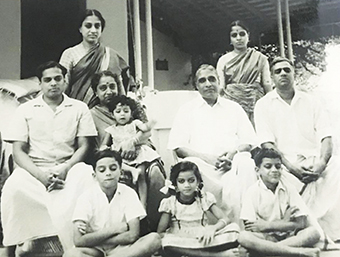A number of people would read the ‘Thula Cauvery Mahatmeeyam’ and have a bath in the River Noyyal or visit Srirangam during the Tamil month of Aippasi. Its a time when the waters of all the rivers are brought to River Cauvery by the North East Monsoons. Bathing in the waters of this sacred Cauvery is supposed to remove all our sins. Its a time when we are made to be aware of all our flaws and a correction process is put in place. Some people do not eat onions during this month. ‘Diwali’ is the time when the victory of good over evil is celebrated with sweets, special oil bath and new clothes. People do ‘Lakshmi Pooja’ and visit the temples. The Tamil month of ‘Karthikai’ is celebrated by lighting lamps on three days particularly. The lamps are prepared and placed on tiny wet cow dung patties and lit in large numbers. Clay lamps are used but the wealthier use silver lamps.
The month of ‘Marghazi’ follows all this and the Telugu speaking people read ‘Thiruppavai’ in Tamil and offer flavoured rice to Goddess Andal everyday. Pongal follows and ‘Sankranthi Pongal’, ‘Maattu Pongal’ are celebrated well. The ‘Vaikunta Ekadasi’ comes before all this and people used to stay up all night for the same by reading the stories connected to Lord Vishnu. ‘Adi Sukravaram’ and ‘Thai Sukravaram’ are important for married women. They visit temples and give manjal and kumkumam (turmeric and vermillion) to friends and relatives. The daughters of the house are given a ‘Peddha Odivala’ once in five years. Its a time when clothes, fruits, betel leaves and maybe ornaments or money is given to the daughters of the family. This is kind of ensuring that the daughters are taken good care of. Some people give a share of the family property as ‘Peddha Odivala’ to the daughter.
Goddess Koniamman is the tutelary deity of Coimbatore and the women of the mercantile community would visit her temple and offer prayers. The household would make a dough and make a lamp with it. Onions would be placed along and this dough known as ‘Jothi’ is placed on the heads of the unmarried kids and they are made to turn around thrice. Later this is taken to the temple. Everyone would offer water and buttermilk during the Goddess Koniamman car festival. ‘Ratha Sapthami’ is another occasion which announces the arrival of summer for the sun would get closer. A picture of a chariot with the sun would be drawn and Pongal will be offered to Lord Surya. He is the really visible God like Mother Earth who is known as ‘Bhumatha’. People celebrate ‘Mahashivarathri’ by visiting temples all through the night. The visits are to the Kottai Sangameswarar Temple or the Pettai Visweswarar Temple (this temple has the sacred banalingam which was brought from the River Narmada long ago). ‘Sri Rama Navami’ is celebrated with neer majjiga (butter milk) and panagam (sweetened water). Everyone talk about the virtues of the decent Lord Rama who is dear to not only his family and Lord Hanuman but to the entire humanity. People try to visit all the three temples – Mathura (Lord Krishna’s birth place), Varanasi (Lord Kasi Viswanath), Ayodhya (Ramjanmabhoomi) at least once in their life time. A visit to Gaya for doing ‘Pitru Tharpanam’ is also important.
Every month ‘Kruthika’ is celebrated with fasting and a visit to the Lord Karthikeya Temple. ‘Panguni Uthiram’ and ‘Thai Poosam’ are special occasions. The ‘Govardhanagiridhari’ utasavam is also celebrated by them.
‘Chithra Pornami’ with flavoured rice is much loved. ‘Chithra Gupta Nomu’ is also another sacred occasion. Chithra Gupta writes the account of all our deeds and it is considered by Lord Yama for punishments or rewards.
Usually people celebrate this for they wish to placate the chronicler Chithra Gupta while also keeping track of their dos and donts.
People try to get better by celebrating these occasions.
The festivals are followed by ‘Akshaya Thritheeya’ the sacred day which celebrates the story of the ‘Akshaya Patra’ which was given by Lord Krishna to the Pandavas during their exile.
The festivals and rituals of the mercantile community are fully non violent, vegetarian while celebrating the oneness of India.
—Rajesh Govindarajulu
Vysial Street Residents Keep Traditions Alive On Ugadi Fest – Part II




